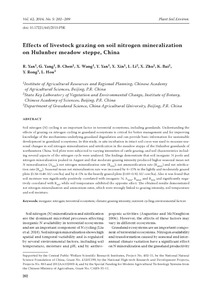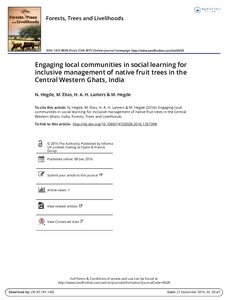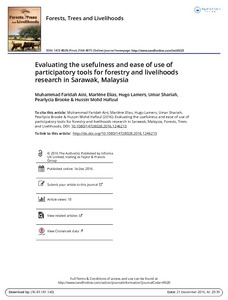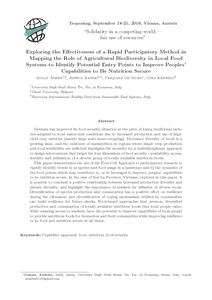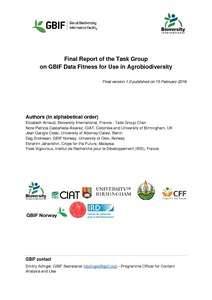Location
Bioversity International is a global research-for-development organization. We have a vision – that agricultural biodiversity nourishes people and sustains the planet.
We deliver scientific evidence, management practices and policy options to use and safeguard agricultural and tree biodiversity to attain sustainable global food and nutrition security.
We work with partners in low-income countries in different regions where agricultural and tree biodiversity can contribute to improved nutrition, resilience, productivity and climate change adaptation.
Members:
Resources
Displaying 36 - 40 of 184Effects of livestock grazing on soil nitrogen mineralization on Hulunber meadow steppe, China
Soil nitrogen (N) cycling is an important factor in terrestrial ecosystems, including grasslands. Understanding the effects of grazing on nitrogen cycling in grassland ecosystems is critical for better management and for improving knowledge of the mechanisms underlying grassland degradation and can provide basic information for sustainable development in grassland ecosystems. In this study, in situ incubation in intact soil cores was used to measure seasonal changes in soil nitrogen mineralization and nitrification in the meadow steppe of the Hulunber grasslands of northeastern China.
Engaging local communities in social learning for inclusive management of native fruit trees in the Central Western Ghats, India
Participatory research and the social learning it supports are increasingly being used to improve forest management. Yet, the participation of women and other marginalized groups is often limited in these processes. This is a serious shortcoming, not only due to concerns for gender and social equity, but also because socially excluded, forest-dependent groups hold specific ecological knowledge, skills and interests that influence prospects for sustainable forest management.
Evaluating the usefulness and ease of use of participatory tools for forestry and livelihoods research in Sarawak, Malaysia
Sarawak, Malaysia, is home to a wide range of native fruit tree species (NFTs) that contribute to the livelihoods of rural women and men. Yet, most agricultural research in the area, and elsewhere, has focused on commercial, non-native species, and the economic potential of lesser-known NFTs has often been overlooked. What is more, little attention has focused on research for development tools that can build on the local ecological knowledge of both men and women while supporting forest-based livelihoods and biodiversity conservation.
Exploring the effectiveness of a rapid participatory method in mapping the role of agricultural biodiversity in local food systems to identify potential entry points to improve peoples' capabilities to be nutrition secure
Vietnam has improved its food security situation at the price of losing traditional varieties adapted to local tastes and conditions due to increased production and use of high-yield crop varieties (mainly large scale mono-cropping).
Final report of the Task Group on GBIF Data Fitness for Use in Agrobiodiversity
Human wellbeing and food security in a changing climate depend on productive and
sustainable agriculture. For this, policies based on analyses and research results are vital to
establish conservation priorities of natural resources that underpin the enhancement of
sustainable food production. Therefore, data from agrobiodiversity and wider biodiversity sources


